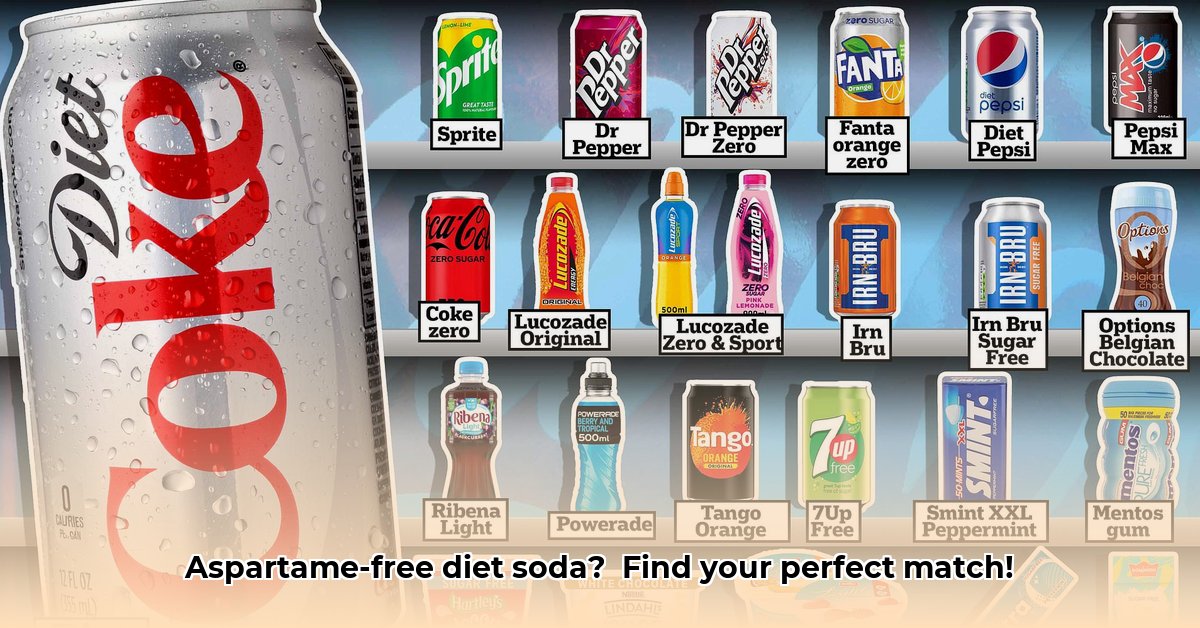“`markdown
Find the Best Diet Soda No Aspartame: Ultimate Guide
Worried about aspartame in your diet soda? You’re not alone! Recent news has many people looking for aspartame-free options, but with so many choices, it can be tough to know what’s best. This guide breaks down everything you need to know about aspartame-free sweeteners like sucralose, stevia, erythritol, and monk fruit. We’ll explore their taste profiles, delve into the science surrounding their health effects (and address the gaps in our current understanding), and compare their costs. We’ll also provide a list of brands and their sweetener choices, alongside practical tips for label reading. All this to help you discover the perfect, healthy soda for you – clear of confusing science jargon! For even more information, check out this helpful guide: Aspartame-free options.
Aspartame-Free Diet Soda: Finding Your Perfect Sweetener Alternative
With recent news highlighting potential concerns surrounding aspartame, many are reconsidering their diet soda choices. We understand the desire for a guilt-free, refreshing beverage. This guide navigates the world of aspartame-free sweeteners, helping you discover a diet soda that aligns with your health goals and taste preferences.
Sweetener Alternatives: A Comprehensive Comparison
The good news is that you have numerous options beyond aspartame when it comes to sweetening your diet soda. Each alternative boasts a unique profile, from intense sweetness to subtle nuances, and varying levels of research backing its safety for consumption. Let’s take a closer look:
1. Sucralose (Splenda): A ubiquitous artificial sweetener, sucralose delivers intense sweetness, approximately 600 times that of sugar. Its taste is widely regarded as clean and sugar-like. While major regulatory bodies generally deem it safe, questions remain regarding its long-term effects, prompting ongoing research and recommendations for cautious consumption.
2. Stevia: Derived from the stevia plant, this natural sweetener offers potent sweetness, often exceeding that of sucralose. However, some detect a distinct aftertaste. It’s generally recognized as safe, though individual sensitivities can vary. Certain individuals may discern a subtle herbal note.
3. Monk Fruit: Extracted from monk fruit, this natural sweetener presents another compelling option. It boasts extreme sweetness and a clean, refreshing taste. Similar to other sweeteners, ongoing research continues to explore its long-term health implications, highlighting the need for further data.
4. Erythritol: This sugar alcohol distinguishes itself with its gentler sweetness compared to other alternatives. Commonly blended with other sweeteners, it creates a balanced sweetness and pleasant mouthfeel. Typically well-tolerated, excessive consumption may lead to digestive discomfort.
5. Allulose: A rare sugar found in small quantities in certain fruits, allulose provides about 70% of the sweetness of sucrose (table sugar). It is considered a low-calorie sweetener.
6. Xylitol: Another sugar alcohol, xylitol offers a sweetness comparable to sugar but with fewer calories. It also boasts dental benefits, inhibiting the growth of bacteria that cause tooth decay.
Sweetener Selection: Balancing Taste, Health, and Cost
Selecting the ideal aspartame-free soda necessitates careful consideration of your priorities. Are you committed to all-natural ingredients? Do you adhere to a strict budget? Are you sensitive to specific aftertastes? The following overview facilitates informed decision-making:
| Sweetener | Taste Profile | Potential Health Considerations | Typical Cost | Natural/Artificial |
|---|---|---|---|---|
| Sucralose | Clean, intensely sweet | Long-term effects under investigation | Moderate | Artificial |
| Stevia | Very sweet, slight aftertaste | Generally safe, individual variations possible | Higher | Natural |
| Monk Fruit | Very sweet, clean taste | Long-term effects under investigation | Higher | Natural |
| Erythritol | Mildly Sweet | Generally well-tolerated, possible digestive issues | Moderate | Natural |
| Allulose | About 70% sweetness of sugar | Generally Recognized as Safe (GRAS) by the FDA | Moderate | Natural (rare sugar) |
| Xylitol | Similar to sugar | Can cause digestive issues in some people; toxic to dogs | Moderate | Natural |
Note: Prices are approximate averages and may vary based on brand and retailer.
Decoding Diet Soda Labels: Empowering Your Choices
Navigating the grocery store, particularly the beverage aisle, can be overwhelming. Follow these steps to confidently select your aspartame-free soda:
Step 1: Scrutinize the Ingredient List: Carefully examine the ingredient list, identifying the sweetener(s) employed and ensuring alignment with your preferences and dietary requirements. Avoid unfamiliar or unrecognizable ingredients.
Step 2: Discern Sweetener Type: Determine your preference for all-natural versus artificial sweeteners, allowing this preference to guide your selection.
Step 3: Evaluate Additives: Consider the presence of other additives, such as artificial colors and preservatives. Opt for sodas with minimal additives if desired, prioritizing shorter and cleaner ingredient lists.
Step 4: Compare Brands: Investigate various brands, recognizing that each employs unique sweetener blends to create distinct taste profiles. Experiment to discover your perfect match.
Step 5: Consult Reviews: Explore online reviews to gain insights from other consumers, potentially narrowing down your options based on their experiences.
Regulations Across Borders: A Global Perspective on Sweeteners
Regulations governing food additives, including sweeteners, vary considerably across nations. Acceptance in one country does not guarantee approval in another. Be mindful of these differences when traveling or ordering from international online retailers.
Making the Right Choice
The journey to discovering the best aspartame-free diet soda is deeply personal. By understanding the pros and cons of each sweetener and carefully scrutinizing labels, you can find a refreshing beverage that delights your taste buds and aligns with your health and ethical priorities. Furthermore, prioritizing moderation is key. Continually monitor research updates to stay abreast of the latest findings regarding sweetener safety and efficacy.
The Quest for Long-Term Health: Unlocking the Aspartame-Free Diet Soda Code
Key Takeaways:
- Growing apprehension surrounding aspartame propels the demand for aspartame-free alternatives.
- Numerous sweeteners serve as replacements for aspartame, each exhibiting distinct properties and potential health implications.
- Diligent label reading and a thorough understanding of sweeteners are pivotal for informed decision-making.
- Ongoing research continues to explore the long-term health implications of alternative sweeteners.
- Selecting the best aspartame-free diet soda for long-term health entails careful consideration of individual preferences and health objectives.
The Sweetener Landscape: An In-Depth Look
The allure of diet soda, with its fizz and flavor, remains strong. However, the International Agency for Research on Cancer (IARC)’s classification of aspartame as “possibly carcinogenic to humans” motivates many to explore aspartame-free options. But what choices are available in the marketplace?
The market provides a multitude of artificial and natural sweeteners. Each one carries a distinct taste profile, production process, and potential health implications. Let’s explore some prevalent alternatives:
-
Sucralose (Splenda): Extensively employed as an artificial sweetener, sucralose is generally recognized as safe by regulatory bodies, including the FDA. Its clean, sugar-like taste is widely appreciated. Nevertheless, similar to all artificial sweeteners, inquiries persist regarding its long-term effects, leading to continued research efforts.
-
Stevia: Sourced from the stevia plant, this natural sweetener garners increasing attention. Although it may impart a slightly bitter aftertaste, blends often incorporate other sweeteners to refine the flavor profile. While largely recognized as safe, some individuals may display adverse reactions.
-
Monk Fruit: Representing another natural option, monk fruit extract delivers a very sweet taste, yet it presents a slightly less intense sweetness relative to sugars. Calorie-free and generally deemed safe, it presents a compelling alternative.
-
Erythritol: As a sugar alcohol, erythritol arises naturally and is linked to a reduced potential for digestive complications compared to other sugar alcohols like xylitol. Its sweetness is characterized as mild.
Brand Showcase: Exploring the Market Variety
Numerous brands are now directly addressing the demand for aspartame-free diet sodas. By way of illustration, Diet Rite is sweetened with sucralose, whereas Coca-Cola’s “Coke Zero Sugar” incorporates a blend of sucralose, acesulfame potassium, and natural flavors. Zevia opts for stevia alongside other natural sweeteners. It is imperative to independently verify labels to ensure information accuracy. This listing serves solely to demonstrate the array of choices at your disposal and does not denote an endorsement of any specific product.
A Word About Phosphoric Acid
Many sodas, diet or otherwise, contain phosphoric acid. While it contributes to the tangy flavor, high consumption of phosphoric acid has been linked to potential health concerns, including bone density issues and kidney problems. It’s another factor to consider when making informed choices about your soda consumption.
Understanding Tartrazine
Tartrazine is an artificial food coloring, a yellow dye commonly in many processed foods and drinks, including some sodas. Some people are sensitive to tartrazine and may experience allergic reactions. Be sure to check product labels if you suspect a sensitivity.
Regulatory Insights: A Global Viewpoint
Regulations concerning sweeteners and labeling exhibit considerable diversity across nations.
- Stainless Food Storage Keeps Your Kitchen Organized And Meals Fresh - February 28, 2026
- Stainless Steel Food Storage for Healthier, Eco-Friendly Meal Prep - February 27, 2026
- Stainless Food Containers Offer Durable Storage for Everyday Meals - February 26, 2026










